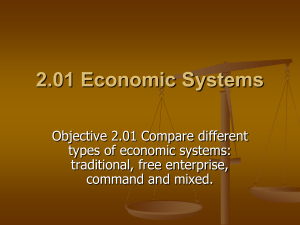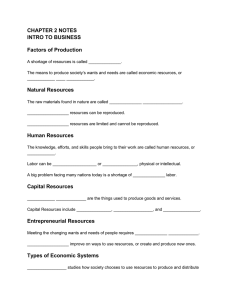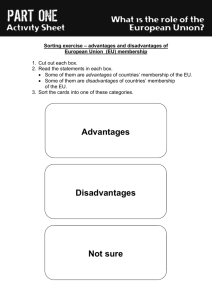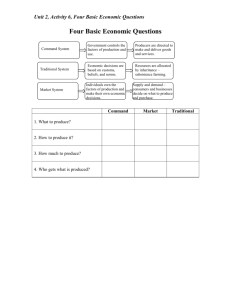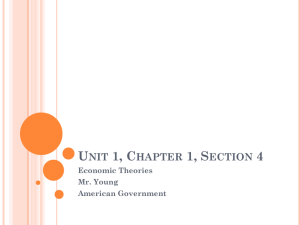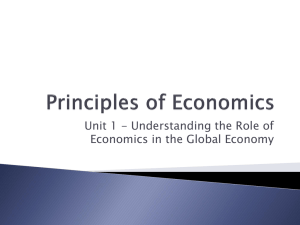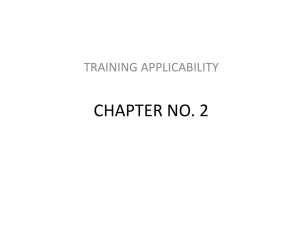Economic Systems2
advertisement
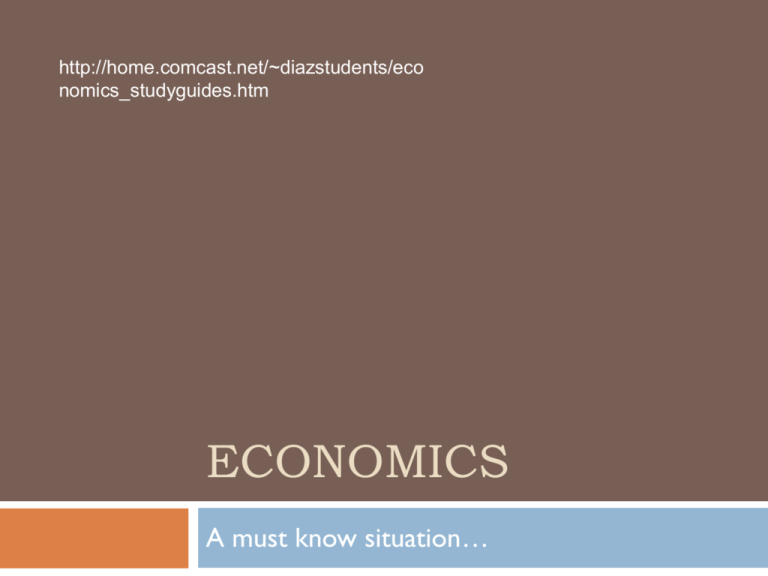
http://home.comcast.net/~diazstudents/eco nomics_studyguides.htm ECONOMICS A must know situation… It is determined that Every Economic System Asks 3 questions: What to Produce What resources do we use to meet societies needs What to produce and how much to produce When an economic system chooses to use a resource for one purpose and gives up the opportunity to use it for some other purpose, What is the COST? Economic Questions How to Produce Who will produce What methods will be used Quality of items How to Distribute Countries cannot produce everything that society wants They find a way of determining who gets the goods and services and who doesn’t SO… ECONOMICS A must know situation… An Economic system Is a set of rules which nations decide how to distribute its Resources to satisfy it’s people’s wants/needs Traditional Economy Definition: Economy is based on custom and tradition Characteristics: Resources allocated by inheritance Strong social network Indigenous (original/native) technology and method Every member of society has a purpose Agricultural Bartering is a common practice Traditional Economy Advantages Lack of over consumption Less demand on resources-goods only produce if needed Cultural network Disadvantages Limited variety of goods produced Not advanced in technology Traditional Economy Command Economy Definition: A central authority makes the key economic decisions Two types: Socialism and Communism Difference is mainly in the level of government control Socialism States owns major resources and makes the key economic decisions Some forms of private enterprise Advantages Individuals allowed to own some businesses More equal standard of living (In Theory) The State takes care of major needs (ie: health care/education) Individuals may start/own their own business Disadvantages Choices limited…because of Limited incentive to produce better products because prices are fixed Communism Strong command economy State makes all the economic decisions State controls resources for the common good State decides what to produce, how much to produce , and how to distribute Advantages More equal standard of living Less crime and poverty (In Theory) State provided jobs, place to live and healthcare Disadvantages Little choices of what to buy Highly skilled workers not rewarded Communism Market Economy Definition: Economic decisions made in the marketplace according to the laws of supply and demand Goal: To allow an unrestricted exchange of goods and freedom of choice Characteristics Interaction between Business & Consumers determine the demand for items Producers influenced to supply goods or services by the prices in the markets – to make a profit Resources are privately owned U.S. Government’s role is to support the marketplace by removing obstacles to trade Market Economy Advantages Free choice Incentives to produce Variety of goods and services Opportunities for entrepreneurship & reward skilled workers Disadvantages Can have large inequities in wealth Higher crime and poverty No guarantee for basic needs Market Economy Mixed Economy Definition: Combination of a market and command economy State takes care of people’s needs – especially low income Marketplace takes care of people’s wants Three ways the U.S. shows command economy influences: Government regulation of businesses, i.e. AntiTrust, Control banks, etc. Government provides for education and defense Provide Social welfare systems - such as Medicare and Medicaid
